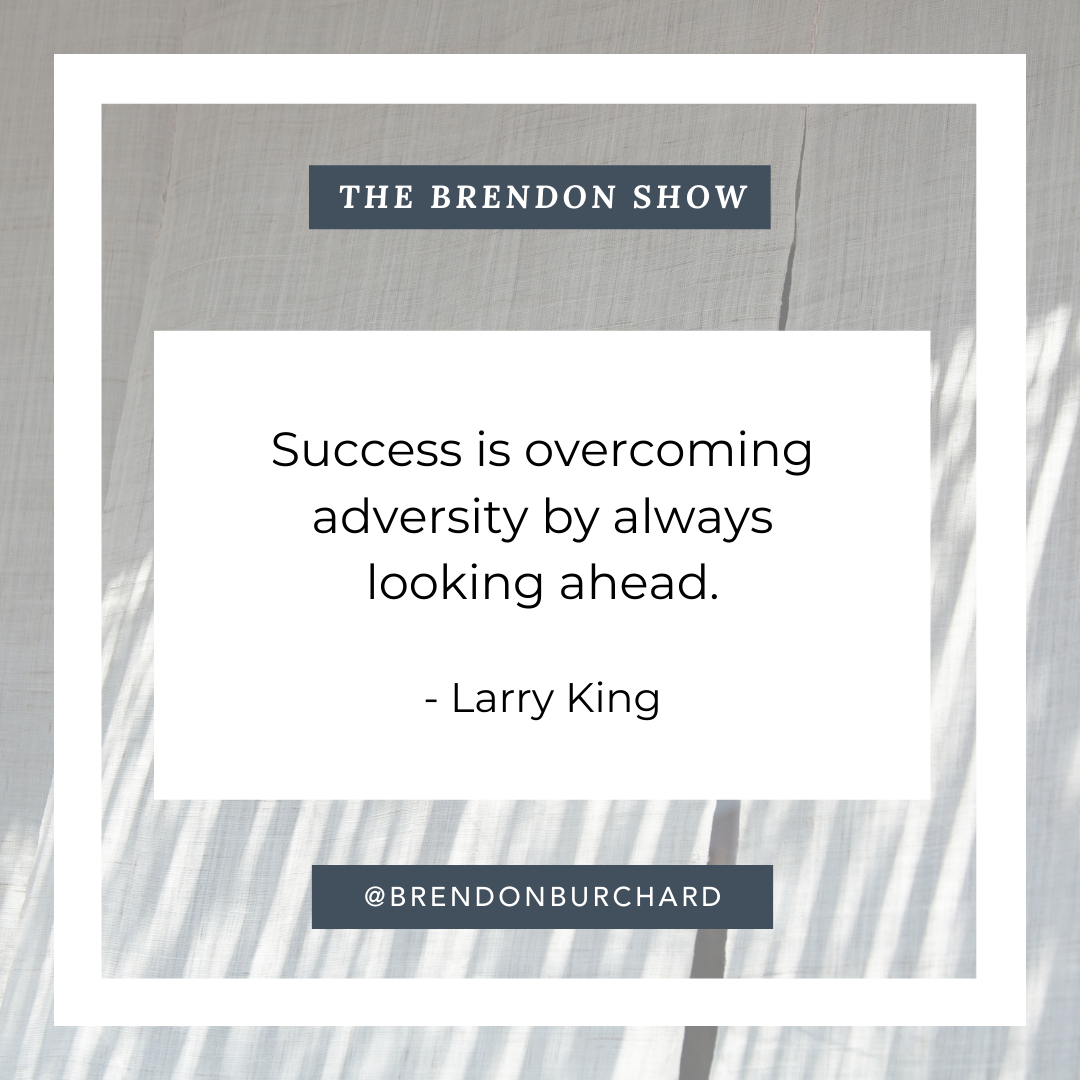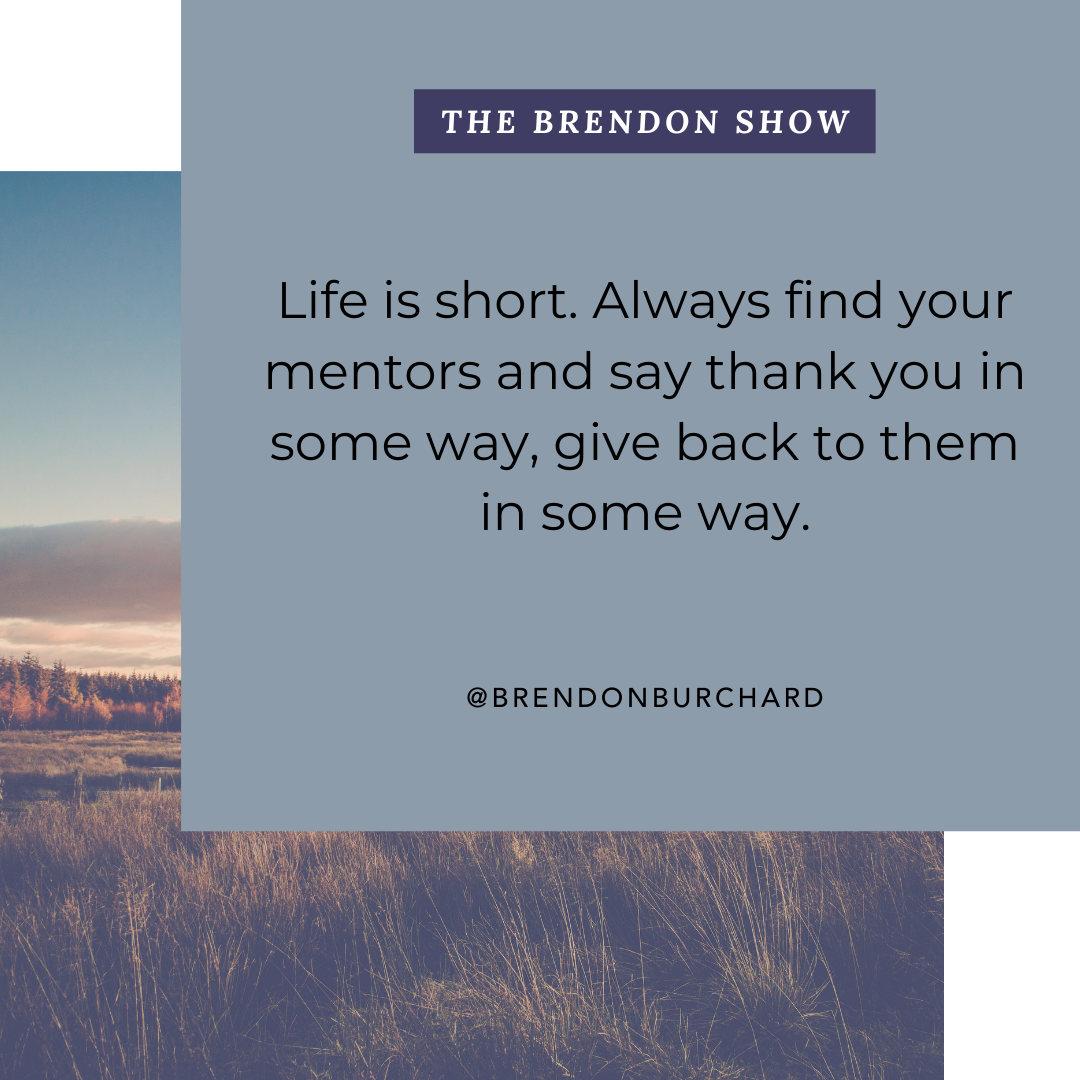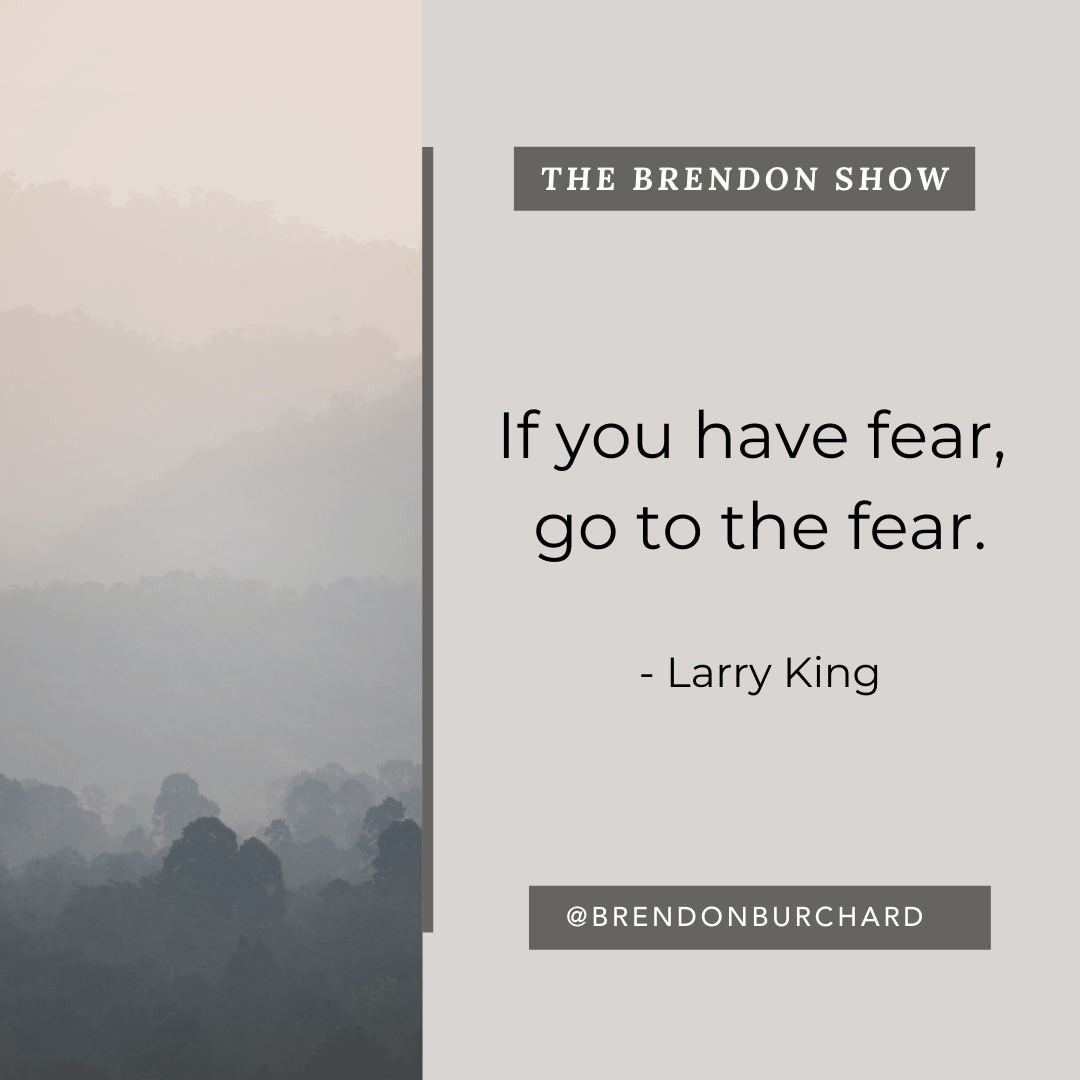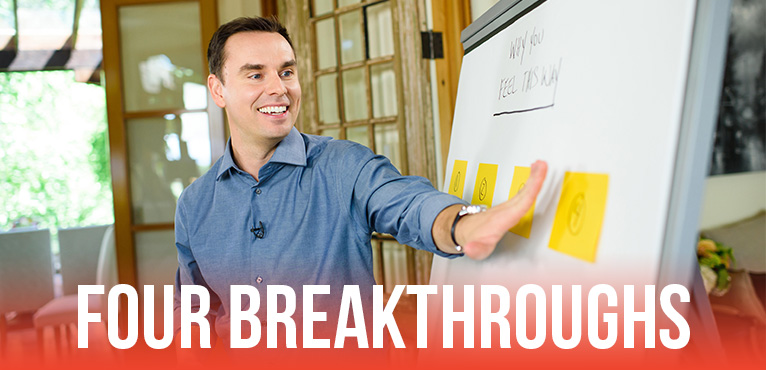SUMMARY
- “Success is overcoming adversity by always looking ahead.”
- In this special episode of The Brendon Show, Brendon releases a never-before-seen interview he conducted with the late Larry King where he shares what he is most proud of, what he’d like on his obituary and tombstone, and how he views curiosity and success.
- “The grass is not greener. Your own grass is better than the grass over there.”
- Thank you to Danny Southwick, Shawn King, and the team at Ora.TV for this footage. It was filmed at Sundance years before Larry’s death. RIP Larry King.
- Watch the video to get the full training.
- Already have the High Performance Planner and CRUSHING each and every day? Let’s celebrate you! Take a photo with your planner and use #HPXlife or #TeamHPX.
HOT NEWS & DEALS!
-
Join the Entrepreneur’s Challenge!
Sign up for my 7-day crash course and you’ll learn the strategies, tools, and revenue drivers needed to start (or scale) your dream business! Click here to sign up!
-
Get the High Performance System!
If you want to level up personally and professionally, High Performance System is the resource you need. The High Performance System will guide you through developing and implementing the 6 science-backed habits that will move the needle from ordinary to extraordinary. Develop the habits that lead to long-term success, positive relationships, and healthy well-being! Get the High Performance System!
DID YOU KNOW?
I give weekly prizes, gratitude and shout-outs to our students, so post a screenshot or video on Instagram and use #TheBrendonShow! I can’t wait to hear your thoughts about this episode!
RELATED POSTS
3 Ways to Communicate Mindfully
How to Create Enduring Happiness
How to Become a Better Communicator
How to Visualize Your Dream into Reality
How to Deliver a Great Speech




FULL TRANSCRIPT
[The following is the full transcript of this episode of The Brendon Show. Please note that this episode, like all TBS episodes, features Brendon speaking extemporaneously–he is unscripted and unedited. Filmed in one take, The Brendon Show has become one of the most viewed unscripted, direct-to-camera self-help series in the history of YouTube. It has also been the #1 Podcast in all of iTunes and is regularly in the top podcasts in Self-Help and Health categories around the globe. Subscribe to the free motivational podcast on iTunes or Stitcher.)
Hi my friends, it’s Brendon, and I come to you with some sad news that Larry King, the famous interviewer, broadcaster, newsman, TV personality and a mentor to me, has passed away on January 23rd, 2021. And in this unreleased video, he and I discussed what he would want in his obituary, on his tombstone, at the end of his life. We talked about what he was proud of, we talked about his famous style of curiosity. We talked about what he thought of success and what made people successful. And it was just a wide-ranging conversation that we’ve decided to post here. We thought with his passing this would be a time because he was very reflective about the end of his life. And I think it really speaks well to him and I hope that you will enjoy the video.
My condolences go out to his family, his friends, to everybody in the industry who’ve been impacted in such positive ways throughout his life. Sixty years in broadcasting, over 50,000 interviews! To say he was a legend and an icon and a pioneer is an understatement. For me personally, when I was a 19-year-old kid, I was in a state of depression and one of the reasons was because I didn’t know how to communicate. I didn’t know how to share my emotions, I didn’t know how to talk to people, I was awkward. And I picked up Larry King’s book, “How to Talk to Anyone, Anytime, Anywhere“. It taught me about the power of asking questions and being present and holding space, and just how to engage with people, which was important for a kid like me who was awkward and a poor communicator. Very early on he changed my life and decades later, I got to work with him on an interview series and film a course with him. He interviewed me multiple times, I interviewed him multiple times, including in his home and in his awards room. I was so happy to have those experiences with my mentor.
Life is short. Always find your mentors and say thank you in some way, give back to them in some way.
I had the blessing to do that with Larry because his son-in-law, Danny Southwick, introduced us and coordinated so many things. Shawn King was so supportive of getting us together and getting us on camera and creating a series together. And again, we never released it and this video is from that. And I just thought you would enjoy it to hear him reflecting on the end of his life. And his family supported and encouraged us to release the video for you. And I just want to share that. I think the secret to a great and long life, which Larry shares, is curiosity. Please enjoy the video.
Brendon: Have you ever had a moment in your life that just changed everything? Changed the course of your life and what was it?
Larry: Well, I didn’t know it at the time but it was my father’s death. I was nine and a half years old, he was 46. We were very close, I have a younger brother. He had lost a son who was six years old before I was born. So I had a brother I never met. And it was a very tragic day, he died of a heart attack suddenly. And I was a very studious student, I skipped third grade, I was a good kid. I was coming home Saturday morning from the library, I took out six books, I was an avarice reader. And there were cops coming down the stairs in our apartment building. He was a pretty popular guy, my father, and the cops knew him. And this cop picked me up, books fell everywhere and he took me in his squad car and he told me my father died. And he took me to a movie to get away from the day, I went to see “Back to Bataan”.
Brendon: Before you saw your mom he took you to the movie?
Larry: Yeah, with Robert Taylor. Well, he was their family, there all day. And I took it very badly and I got angry. I didn’t understand death, I got angry at him for leaving me. I didn’t go to the funeral. I took it very badly. There’s a great play by James Agee called “Dark at the Top of the Stairs”, Another title of it is “A Death in the Family”. In which your nine-year-old boy is faced with the death of his father and the family telling him he’s now the head of the house. And I couldn’t handle that. You’re now the head of the house. So I became —
Brendon: Did someone actually say that to you as well?
Larry: Oh yeah, now you’re the man. And I was bar mitzvahed, but I wasn’t a very good student the rest of the way. I fudged things a lot, I cut classes. I just went to high school, never went to college. So that left a lasting impression on me. But the one resolve I had was that I loved radio. And when I was a kid, when I was five years old, I used to listen to the radio. I’d listen to Dodger games and radio programs. I was fascinated with it. I used to imitate them. I’d hear programs and imitate the announcers. When I was 12, 13-years-old, I’d go into the city, we lived in Brooklyn, we called Manhattan the City. And I’d go around to radio shows just to watch people perform on the radio, speak away —
Brendon: As how old?
Larry: 12, 14.
Brendon: How’d you wander in there, did they say, “Hey kid, get out of here”?
Larry: I took the subway. Some shows had studio audiences, quiz shows. And I was fascinated with it. I didn’t know how, quite what to do, but I had a bunch of odd jobs. 1920/1921, my brother went to law school. I worked to help my mother. We were on relief for two years in New York City. I bought my first pair of eyeglasses, all of which I blamed on my father. Relief was a hard thing to take in. For two years they told us what we could eat and the city paid our rent. It was New York City, a very generous city. That’s why the older I got, the liberal I got. I understood welfare and I understood relief and I understood poverty.
Brendon: This is the city helping take care of your family after your dad passed?
Larry: Correct. The city is a big family and that’s what a family is supposed to do. But then I got a break and met a guy in the street who told me to try Miami and I broke into radio. But the most revolutionary event, if I would look back, would be that death. We would go to ball games and come back and describe the whole game to my friends. Tell them about movies. I like describing things.
Brendon: You’re a natural communicator already.
Larry: Natural, and I was also always curious. Anthony Quinn told me that, that you have the luxury of curiosity and that has never left me.
Brendon: Do you think that’s your number one strength?
Larry: Absolutely, to this day, it lends to my sense of humor, it lends to things about me, I never have all the answers. I hate people who have all the answers. I don’t hate them but…
Brendon: You can see it.
Larry: People who think they know everything don’t. So I never had a guest where I thought I knew more, more about law than a lawyer, more about government than the governor. More about show business than the singing star. So therefore I was curious. But I could remember, I swear, I could remember being nine years old, getting on a bus and asking the bus driver, “Why do you want to drive a bus? What do you get out of driving a bus?” So I never lost that. And anybody who’d ever watch all my shows to this day you rarely have ever hear the word “I”. I don’t use it, it’s irrelevant in an interview what I think is —
Brendon: This is hard for you, right then?
Larry: Well, now I’m being asked, so I know what you want.
Brendon: That’s right.
Larry: I’m responding to you. But if I was doing my own show, there’s no reason to say the word, “I”. What I think is irrelevant. What the guests thinks through me, I’m a conduit to the audience. So I’m a storyteller, I love to talk. I do a comedy act, I love making people laugh, but when it comes to a guest, the guest counts. And I’ve just always been insanely curious. I’m the kind of person you really do not want to sit next to on an airplane. I was doing a radio show at Pumpernick’s Restaurant in Miami, Miami Beach. Before Bobby Darren came in one day, he was the first famous person I ever interviewed. I would interview a salesman, waitresses, it was a coffee clutch show. I do my own disc jockey show in the morning, then run up and do this hour interview show. And one day there was a plumber in the audience, a plumber. And I called him up and I did 35 minutes of asking questions of a plumber. Now, I was 22 years old, 22 and a half, I still remember things I learned at that interview. That plumber is just as happy at the end of the day when he fixes the faucet or stuffs the leak, as I am when I interview someone and get something out of them. It’s that same degree. I love what I do!
Brendon: What do you feel if someone writes in those, the fan writes in and says, “Well, Larry, sure, you can be on the fly, this is comfortable for you, but I have all this self-doubt or I have this fear”?
Larry: If you have fear, go to the fear. In other words, you’re nervous when you get up in front of an audience. I’m nervous.
Brendon: You can say it, tell people.
Larry: Sure, I did it my first day on the air. This is a memory that lasts with me forever. All my life I wanted to get into radio. I go down to Miami. I knock on doors. A station says, “Hang around here. We’ve got one opening, you’re hired.” They get an opening. I’m going to start Monday morning, dish jockey. It’s Friday night. I told them when to stop Monday morning. I stay up all night, and I do not sleep. I’m nervous, I’m practicing. “Hello, Good morning”, or whatever they are saying and then I pick out my music. I’ve gone here at nine. I get to the station at 5:00 AM. I’m all prepared. I go into meet the general manager. It’s quarter to nine. I go on at nine. He says, “Larry, good luck starting your career. What name are you going to use?” I said, “What do you mean?” He said, “But you can’t use Zeiger, Larry Zeiger.” Now you could use it, it doesn’t matter now. He said it’s too “ethnic” and people wouldn’t know how to spell it. You need another name. What are we going to do? I’m going to in the end in 15 minutes. And he had the Miami Herald open. I would later write a column for the Miami Herald. And there was an ad for King’s Wholesale Liquors on Washington Avenue. And he said, “How about Larry King?”
Brendon: He chose it.
Larry: Yeah, I said, “It sounds okay.” I later legally changed it. So I sit down and go. I’ve got my record cue, (sings), now I got to fade the music and talk right? (sings) I fade the music and nothing comes out. I bring the music back up —
Brendon: Nerves?
Larry: Nerves! I fade a bit, I’m looking at the clock, it’s now two minutes after nine. Or if you’re listening at home all you hear is music going down and up, down and up. And the general manager kicked open the door. Marshall Simmons, I’ll never forget him. He kicked open the door to the studio and he said, “This is a communications business, damn it, communicate!” And he slammed the door. I turned on the mic, turned down the record and said, “Good morning, my name is Larry King.” That’s the first time I ever said that because I’ve just been given that name because I’m starting my career in radio today. And my name was too ethnic. So they gave me this name, Larry King. And you’ve been listening to the record, go up and down ’cause I’m so nervous. I tell you that all my life I wanted to do this, and this is my moment. My hands are shaking and I’m scared. And I wonder if I can do this. So I’m going to do the best I can. I was never that nervous again in any day of my life —
Brendon: Gave you confidence acknowledging it.
Larry: Just by being honest.
Brendon: As you get that successful, more known worldwide, comes more stress, more opportunities. Do you have any practices you do in your life to keep you stress-free?
Larry: Stress I think was a good thing to me.
Brendon: In what way?
Larry: Henry King Stanford, the former president of the University of Miami, he said that some people strive on stress. I like stress if I was put in a position of having to broadcast an event that I’d never broadcasted before, which would be stressful. I liked that.
Brendon: You thrived on the challenge? Is that what it was?
Larry: I liked it because I liked the fact that it’s in my hands now, and I had a scene once where, when I was at CNN a building in Manhattan blew up. It blew up. Someone had placed the bomb in the building. And it was right around the corner from my hotel. So I ran down the street and I’m in the middle of the block and the fireman knew me and they let me through. So they got the hoses going and bringing and all the people are being kept on the corner. So I did what I had to do. I called CNN and I went on air and they kept going back to me and I’m describing this building burning. I’ve never had to describe a building burning before or fireman. I’ve never done that, but I never thought about it.
Brendon: And there’s no camera with you. It’s just on the phone—
Larry: No camera, they were taking my voice. Later you could say that was stressful. Because if he asked me, “Boy, have you ever described a live building on fire by exploding?” No, but did I think about it? No.
Brendon: You were just in the moment but how—
Larry: Trusting my instincts.
Brendon: You must have dealt with a lot of entertainers or other people who appeared on your show. They were terrified of their performance. They were worried. What do you say to them to calm them down and deal with that?
Larry: I try to ease them.
Brendon: How do you do it?
Larry: I do it a lot with eyes, voice, eye contact. I care about you. Some of the most difficult people I’ve had the best time with. I got Sinatra, and he was hard to get, he didn’t like doing interviews. So I would ask him, “Why don’t you like doing interviews?” And there is by feeling them out. Some of this is inborn I’m sure, but some of it you can use in your daily life. Trust your instincts. Instincts are pretty good. If you don’t like someone—-
Brendon: Follow that.
Larry: Follow that. Pretty good you may be wrong but you’re better off trusting the instinct than not. And I’ve always trusted my broadcast instincts. And that’s not the same as life instincts. I made a lot more mistakes in life than I ever made on the air.
Brendon: What was some of the big mistakes, where you learn some—
Larry: I married wrong people. I made bad decisions. I didn’t handle money well, a lot of that was a carry over from my childhood of being the poorest kid on the block. All my friends had more money than me.
Brendon: And so how did that carry over into—
Larry: I guess people thought I wanted more. So I had to drive a bigger car. So I bought a car I couldn’t afford. And then I had to make payments.
Brendon: What makes a successful person?
Larry: How do we define success? Success to him may be how much money he has. Success to him it was how is his children doing? So there were degrees where we can define it differently.
Brendon: Do you think most people feel like success in their life? You think most people are walking around—
Larry: I would say most people don’t think they’re successful. Most people think the grass is greener. The grass isn’t greener. That’s a good advice I give to you.
The grass is not greener. Your own grass is better than the grass over there.
Brendon: To appreciate what you have.
Larry: Appreciate what you have. And you used the word before challenge. Jackie Gleason told me once he didn’t like challenges. He liked doing what he liked to do. He didn’t need to be challenged.
I feel that success is overcoming adversity by always looking ahead.
The sun will come up tomorrow. And the driving part of me—it’s not the driving for finances or the driving for a claim. It’s the driving to be there, to be in the hunt, to participate, to have value, to know that you matter. It can matter that—if your children love and respect you, and you’re a motorman on the subway. But when you come home at night, your children adore you. When you go to open school week and the teachers say your kids are terrific, that’s success.
Brendon: So it starts with them defining success.
Larry: You define your own.
Brendon: What gets in their way the most often? What do you think gets in people’s way?
Larry: Turbulence, unexpected things. The traffic accident, the sudden death of a father, sickness. John Kennedy said, “Life isn’t fair.” Life’s not fair. Not fair. Why did that child die, why did he live? Hitler lived to 67, someone died at 12. It ain’t fair. So turbulence hits you in life and you have to do the best to overcome them.
Brendon: How have you done it?
Larry: I met so many people in my life who say, “I’m going to do this,” but they don’t do it. “I’m going to write, I’m going to…Boy I’m going to put this deal together. I’m going to be successful.” Woody Allen said it best, “Get off the porch.”
Brendon: Get in the game, do something—
Larry: It’s so easy to sit on the porch and say, “Hey, tomorrow I’m going to get off the porch.”
Brendon: Get into the game.
Larry: I always got off the porch. Nat King Cole said once, “There are two kinds of people in the world. 98% watch the fox hunt. They watched the people go chasing the fox. They sit on the porch, they applaud the winner. They boo the loser. 2% chase the fox. I always chase the fox.
Brendon: You feel like you’ve changed in the last 60 years, well how so?
Larry: Yeah, of course. Well, I hopefully have matured. There’s still a little kid me. And by the way, that’s important. Don’t let the kid in you leave. If I had to give advice to someone, don’t give up that little childhood thing.
Brendon: The childishness, the wonderment, joy, and the innocence.
Larry: Yeah, enjoy. Whatever profession you have, give to it. I’m naturally competitive, I guess, but be the best at what you do. Just try to do the best. A rabbi told me when I asked a rabbi, “Rabbi, do you believe in heaven?” He said, “Well, maybe there is, maybe there isn’t. But I tell you, what lead a good life. Take a chance.”
Brendon: What’s going to be part of you leading a good life for the next, this next chapter, in next years of your life? What are you really focused on?
Larry: I don’t know what to think about it at 81. I think about health. I think about taking care of myself. I try to keep a better pace. I try not to think depressing thoughts. I think a lot about—I shouldn’t be doing this a lot—I think a lot about dying and I shouldn’t do that. So if I’m giving you advice—
Brendon: What are you thinking about when you think about it when you said—
Larry: About not being here thought of not existing for eternity.
Brendon: Is that heavy?
Larry: Heavy? In other words, I think Mario Cuomo just passed away. A great friend of mine. I think about him every day. And Mario is not seeing what happened last week in ISIS, he’s not seeing the storm today in New York and he’s not seeing any of that. He’s not existing. And when I’m not here, how will I be here? For example, I’m not a fan of sleep. I know I have to sleep. I know I fall asleep, but if you could give me a wish, high up on the list would be—don’t sleep.
Brendon: A little more a little bit more each day—
Larry: To not have to sleep. Suppose if you didn’t have to sleep.
Brendon: Be awfully tired.
Larry: No, no, that one probably you don’t get tired. You don’t get tired and you don’t need to lay down. That would be my wife’s suicide. Not to get tired. If I didn’t get tired, life would be a joy because there’s somewhere in the world people are up, right? So something’s happening here when in Europe something is happening.
Brendon: Do you always feel like you’re missing out on something?
Larry: Yeah.
Brendon: You do? Is that what keeps you up?
Larry: A lot of times, I think about things. I think about worldly things to think about other things. I don’t know what that is, I—
Brendon: As a curiosity, you were talking—
Larry: I guess it’s curiosity. I panic when I get a little illness. This is not good advice for people.
Brendon: Well, this is good, but this is a good place for you’re talking about, thinking about death and thinking about life. So if you have this moment where you get to think about your life and it stood for something stood for message—
Brendon: Well, I think I entertained people. I think I helped educate people through the gift of asking good questions. I hope that I made that little small piece of this endless universe add something to the knowledge of people. It’d be nice to be missed. I don’t want to be a “Whatever happened to…?” But it saddens me when I’ll mention names like Arthur Godfrey and people don’t know who I’m talking about. And this was a man who accounted for 38% of CBS’s income—radio and television—every day.
Brendon: Legend.
Larry: And no one knows him. People don’t know him and that I want to be known.
Brendon: Well, you’re known and—
Larry: I guess my tombstone, my tombstone would say, “I’ll be right back.”
Brendon: What are you most proud of?
Larry: I’m proud of a lot of things. I’m proud of my family. I’m very proud of my family. Proud of my kids. All of them. Some are more successful than others but all of them are good kids. I’m proud of my wife. She’s a hell of a lady.
Brendon: She’s incredible.
Larry: She is incredible. She’s not the easiest person to live with but why do you want someone easy to live with?
Brendon: If you’re on—
Larry: I’m very proud of my accomplishments too. I’m proud that in my industry, I’m in halls of fame. I got a lifetime achievement from the Emmys.
Brendon: You had a career success.
Larry: When your peers acknowledge you, that’s a great, great thing. And then I’ve had that great thing happen to me—that the peer acknowledgement. And if people still on the street recognize me and say, “Hello Larry,” or one of the biggest little compliments I got…I don’t even know if I ever told my wife this. I flew to Tampa to interview John McCain when he was running for president at the University of Tampa. We flew down there. We were going to do an hour at the university. And I flew in, he flew in, we both came in on private planes, came in about the same time. We pull up at the university and we’re walking through the student lounge to go to where we’re interviewing and all the kids are going, “Hey Larry, hey Larry. Hey Larry, how are you, how are you Larry?” and John McCain said to me, “Why didn’t you run?” That was a proud moment.
Brendon: That’s a proud moment. If you’re on your last show, your last interview, what would your sign off be?
Larry: I like to say I’ll be right back. I’ll tell you what I like my obit to be, “Oldest man who ever lived passed away today smiling in bed. Oldest man who ever lived.”


